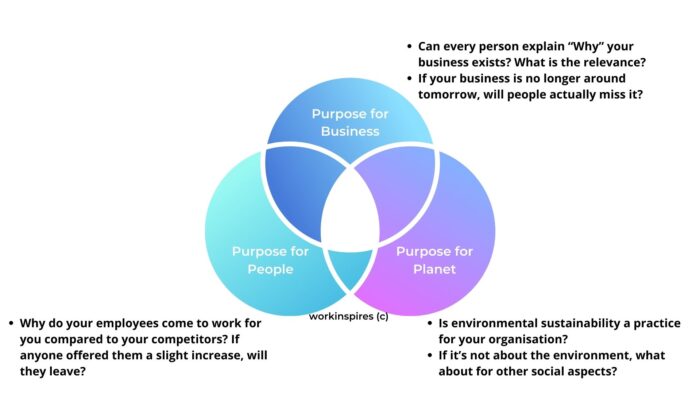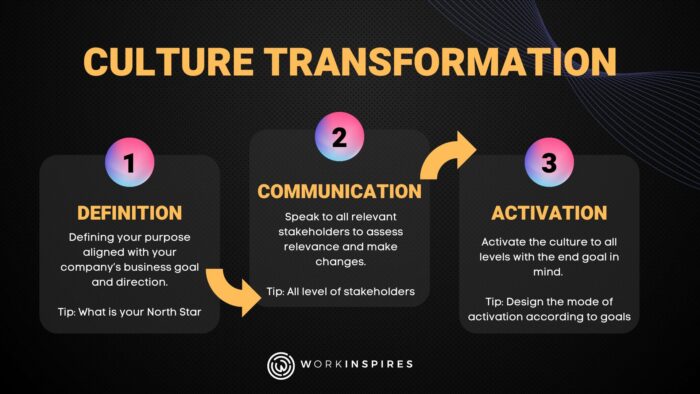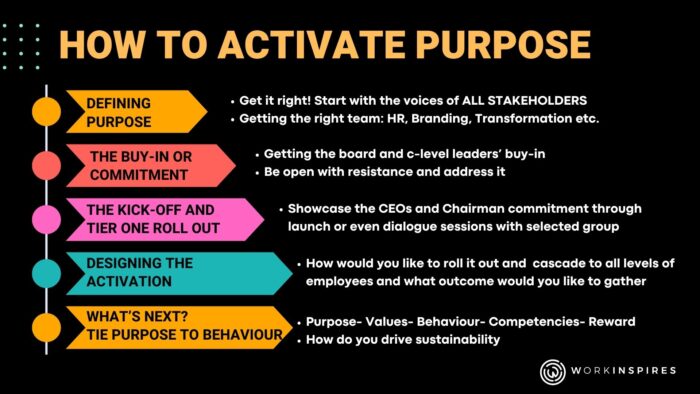Is “purpose-driven culture” still relevant for 2024?

Throughout the year, we have seen, heard, or experienced organisations speak about the importance of having the right culture, especially when they see a dip in their engagement scores. However, do we understand the importance of culture and have a purpose-driven culture? As you are about to read this article, ask yourself, “What is your end goal of creating a purpose-driven culture? Was it proposed because it is a business necessity, a branding effort, or simply because other companies are doing so”?
According to The State of Organizations in 2023 | McKinsey, among the 10 shifts transformation organisations include:
-
-
- Increasing speed and strengthening resilience
- True hybrid: The new balance of in-person and remote work
- Making ways for applied AI
- New rules for attraction, retention, and attrition (especially with the different generations)
- Closing the capability chasm: Only 5% of companies say they have the talents they need)
- Walking the talent tightrope: Balance of development and budget
- Leadership that is self-aware and inspiring: Only 25% of respondents said their leaders are engaged
- Making meaningful progress on diversity, equity, and inclusion
- Mental health: Investing in the portfolio of interventions (i.e., going beyond awareness)
- Efficiency reloaded: More than 40% of respondents point to complex organisation structure as a cause of inefficiency.
-
How many of the 10 have impacted you? How did it impact you? The question now becomes, how does culture fit in? Before we dive in further, let us go back to the basics, “What is company culture?”
Generally, there is no single definitive of company culture but I find this definition by Harvard Business Review the easiest to understand, “Culture can be defined as the ways people in the organisation behave and the attitudes and beliefs that inform those behaviours (i.e, ‘the way we do things around here’)—including formal, stated norms as well as implicit ways people work and interact. At many organisations, there is a gap between the existing culture and the ‘desired’ culture—the culture needed to support and advance the company’s goals and strategies. In a new culture-building model, everyone is responsible for cultivating the desired culture.”
So going back to the 10 transformative shifts earlier, culture essentially is the behaviour of the people in your organisation to help expedite or derail those transformations.
Let us look into “Purpose-driven culture”. Simon Sinek, in his “Start with Why TED Talk” spoke about how “Very few people or companies can clearly articulate WHY they do WHAT they do. By WHY I mean your purpose, cause, or belief – WHY does your company exist? Why do you get out of bed every morning? And WHY should anyone care?”
When organisations were born, the founders knew “The Why”, but as years passed, leaders forgot and soon the “Why” merely became part of History. However, there are organisations that still practice this well. A clear example is Patagonia.
Many have forgotten how founder Yvon Chouindard, started his business Chouinard Equipment (which became Patagonia in 1973) because he loved to climb and by 1970, Chouinard Equipment had become the largest supplier of climbing hardware in the United States but their Piton business was also damaging the environment. Knowing this, they actually minimize the business whilst looking for alternatives.
Beyond just releasing publications about sustainability, the team has been involved in numerous initiatives such as saving the Ventura River in the 70s. In 1986, they committed to donate 10% of profits each year to the right causes. In 2018, Yvon Chouinard and CEO Rose Macario renamed the organisation’s purpose to “We are in business to save our home planet. Quoting Yvon, “I am dead serious about saving this planet”. 50 years later, a strong mission statement was released, “Together, we can prioritize purpose over profit and protect this wondrous planet, our only home.”
I hope this short story of Patagonia inspired you to relook at your “purpose” as an organisation. Mind you, they started this even before ESG became the new “buzzword”.
So for 2024, let us start tying, “Purpose” into the foundation:
To start talking about “purpose-driven”, we will need to first ask ourselves the tough questions (as referenced above). Most business leaders we work with have difficulties with “If your business is no longer around tomorrow, will people actually miss it?” or will they immediately run to your competitors?
That helps you to think about and be honest about your gaps, may it be people (including the leaders), policies, infrastructure, products, or the culture as a whole.
This allows you to identify your “North Star”. What is your key focus and how can everyone be aligned on that purpose?
From there we can now move to a simple 3 step strategy to roll it out:
Finally, to accept that a full culture transformation goes beyond grand launches, playbooks and fancy merchandise.
It is about the behaviour and common understanding of every employee from the CEO to tea lady in the organisation.

“What is your end goal of creating a purpose-driven culture? Was it proposed because it is a business necessity, a branding effort, or simply because other companies are doing so?” – Mallory Loone, Co-Founder, Work Inspires
Everyone should be able to be aligned with the “why”. Hence activation should be done in stages and customised to all employees because, in the end, they are your brand, hands, and legs that will help drive your transformation for business sustainability.
A common question asked, why should we involve everyone?
Here is a simple example of the impact that we have experienced with a client of ours. From their purpose activation cascade, a value they derived was “lead as a business owner”- which translated to behaviour of “treat your work in the organisation as if you are the owner.”
Now after the activation, a tea lady of the client, took it on her own terms to initiate daily briefings among all the tea ladies, to share about:
-
-
- How many meetings were they going to serve tea in
- How many of their audience drink coffee or tea or none (as per their knowledge)
-
This was done because she noticed a lot of wastage with drinks in meetings and these wastages though they may seem small actually cost money.
READ MORE: Navigating Malaysia’s talent landscape
When the boss found out, they were very proud and shared her example in the town hall. Of course, she did receive a small token as an appreciation but her actions now inspired many to look at “ownership” in a different light.
In summary, purpose-driven culture may be a buzzword but if used right, can be a strong foundation for your business to thrive in this hyper-competitive age today.
About the Author: Mallory Loone is Co-Founder of Work Inspires, and host of CHRO Malaysia.
Join Mallory and an exciting lineup of speakers at CHRO Malaysia, which is taking place in Kuala Lumpur on November 22.






